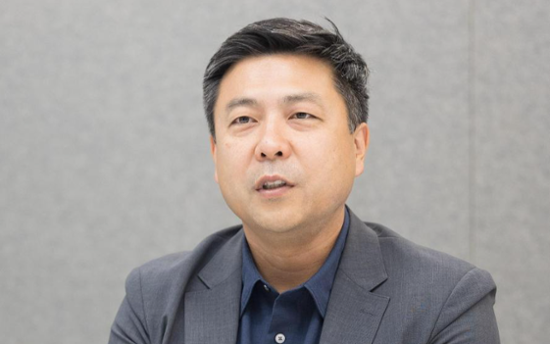Moloco founder and CEO Ahn Ikk-jin speaks during an interview with The Korea Times at its office in Seoul, Tuesday. Courtesy of Moloco
Ad-tech firm has yet to fix date for Nasdaq listing plan
By Lee Min-hyung
Moloco has identified India as a major target for expansion with the recent launch of a tech-intensive office in Bengaluru, the country’s third-largest city, Ahn Ikk-jin, founder and CEO of the machine learning-powered advertising solution provider, said.
The Silicon Valley-based startup was founded in 2013 by the Korean entrepreneur. The company has since achieved outstanding growth, with its corporate value surpassing $2 billion (2.67 trillion won).
Moloco’s core strength lies in its unique business portfolio and unmatched tech prowess. The firm provides enterprise-level advertisement solutions, so its clients can display advertisements optimized for their users.
Moloco has already grown to become a global company, operating 13 branch offices in 10 countries across the globe. It runs its business in international cities, such as New York, Seattle, Tokyo, London and Seoul. According to the company, it generated more than $300 million in sales in 2023.
The Moloco founder expressed its ambition of penetrating other major cities with huge growth potential.
“We recently launched an opening ceremony for our Bengaluru office in India,” Ahn told The Korea Times in an interview on Tuesday. “The office will serve as one of our major tech hubs, so we can build more advanced technologies for deeper inroads into the market.”

Moloco founder and CEO Ahn Ikk-jin poses during an interview with The Korea Times at its office in Seoul, Sept. 10. Courtesy of Moloco
Moloco’s partnership with India’s JioCinema is one of the most successful business cases for the startup, according to Ahn.
JioCinema is a subscription-based media streaming service company. Under the partnership, Moloco applied its machine learning-driven advertisement technologies for India’s cricket league. The sport is widely beloved by global sports fans.
JioCinema secured an exclusive online streaming license for the league in India. The partnership enabled the Indian firm to expose billions of customized advertisements to more than 32 million viewers, according to Moloco.
“We are on course to create massive influences in India with our streaming monetization business solutions,” Ahn said. “For now, Moloco places a strategic focus on India, as the market is tech-driven and comes with massive demographic growth potential.”
The Moloco chief studied computer science at Seoul National University and furthered his knowledge of machine learning in the United States, earning a master’s degree from the University of Pennsylvania.
He started his career as an engineer at Google in 2008. After working for the tech giant’s YouTube and Android development teams for around six years, he decided to run his own business and founded the startup.
“Our business has grown much faster than expected in line with the global boom in artificial intelligence and machine learning,” he said. “Moloco’s first client was Uber, and the company was very agile in its business expansion, which also cast a positive influence on our growth.”
The number of Moloco’s global clients reaches around 2,500, and the company makes more than 90 percent of its sales in non-Korean territories. The company plans to list on the Nasdaq but did not share a specific timeline.
The firm is now generating most of its sales in the U.S., China, Britain and Germany, but Ahn hopes to diversify its sales into other regions.
“We also identify Japan as one of our key strategic markets for growth along with India,” he said. “We will attend the upcoming ad:tech Tokyo exhibition in October to expand our presence in the Asian economic powerhouse and clinch more ties with local clients there.”
Moloco runs businesses with a focus on three key sectors: targeting mobile app developers, e-commerce firms and streaming service operators.
“Our (major) partners include Rovio, best known as a developer for Angry Birds, a group of other global game firms,” he said. “We also have ties with Korean retail giants, such as CJ and Lotte. Moloco also helps Tving, an online streaming platform firm, generate more revenue with our ad-tech solution.”
The company makes more than 80 percent of its sales from mobile app clients but hopes to widen its sales portion in the e-commerce and streaming industries.
“Sales from the e-commerce and streaming sectors are on track for faster growth for the past few years than those generated from mobile app developers,” Ahn said. “We will attract more clients in the two emerging growth areas, helping them make more profits with our state-of-the-art ad-tech solutions.”

Participants in Moloco’s artificial intelligence (AI) conference, Molocon Seoul 2024, are seen at the COEX convention center in Seoul, Tuesday. Courtesy of Moloco
Advice for aspiring startups
Ahn advised young aspiring entrepreneurs to pay attention to partnerships with small yet agile companies.
“A number of our clients were not big companies in our infancy,” he said. “But those ready for rapid changes achieved robust growth in a short period of time. Startups are advised to sign partnerships with such firms and focus more on mapping out strategies for their global expansion. It is time for Korean startups to expand their footing into the global market.”


